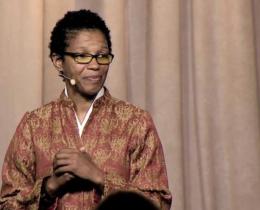Omega: How can the second agreement, “Don’t take anything personally,” be useful for us when it comes to family members and friends?
don Miguel Jr.: My father taught me that I’m responsible to the tips of my own fingers; I’m not responsible to anyone else. To take things personally is to assume responsibility for someone else’s will. Here’s a story of how my father taught it to me:
One day we are in Syracuse, New York. The people who invited us there to teach had put us up at a very nice hotel. We had finished our presentation and went back at the hotel.
My father says, “Miguel, let’s go have dinner.”
Now, the restaurant at the hotel is quite fancy and people are dressed very nicely.
I say, “Let’s go upstairs and freshen up because I see that everyone else is dressed well.”
My father says, “Okay.”
We both go upstairs to get changed in our rooms. I come back down dressed well. A few minutes later the elevator door opens and out comes my father dressed in his pajamas and slippers.
I’m thinking, “Oh no, this is one of those moments—he’s going to try to teach me something.” But I don’t want to bite.
He looks at me in the eyes and asks, “Is there anything wrong Miguel?”
I answer, “Nope, nothing wrong.”
He asks, “Are you sure?”
I answer, “No, let’s go eat.”
He starts walking toward the restaurant and I walk behind him like an embarrassed teenager. We get to the restaurant and there’s no sign that states a dress code but people are in suits and nice dresses.
We walk through the restaurant to our table. I’m feeling very self-conscious and embarrassed. I’m still walking behind him and I can see the heads of other customers turning to look at him and I can hear the low rumbles and whispers.
Before we sit down, my father looks at me again and asks, “Is there anything wrong?”
And I answer, “Nope, nothing wrong.”
We sit down, and because my dad is in his pajamas he forgot to bring his glasses. His girlfriend lends him her glasses, but they’re a different prescription so when he puts them on his eyes look bugged out.
In that moment, my poker face gave out, if I ever had one.
My dad asks, “Miguel, what is wrong?”
I say, “Papa, c’mon it’s a nice restaurant. The people here are all dressed nice and here you are dressed in your pajamas. They’re going to think you’re some kind of eccentric guy, like Howard Hughes or someone.”
My dad looks back at me and says, “Do you disrespect me so much that you don’t think that I can pay the consequences of my own actions? Do you think you must pay for me? You think you should pay on my behalf?
And I look at him and I realize that’s what I’m doing. Part of my domestication was learning this idea that who I am is based on who I hang out with. Birds of a feather fly together. I’m embarrassed because I’m so close to him. He represents me. He stands for me. If his actions reflect me, then he better not embarrass me.
And that embarrassment that I feel is taking responsibility for his actions, and it drives me to judge him. It helped me become aware that I wasn’t respecting him.
That’s how I learned how I take things personally. If I believe the actions of others reflect upon me, then it will drive me to take things personally. Not taking things personally really means taking full responsibility for the choices I have control over, which are my own. If my father is embarrassed, let him be embarrassed. If he’s not, he is not.
Omega: What are some of the most common unacknowledged agreements among families and friends? For example, "We don't talk about that,” or “We always celebrate the holidays in this way." How can we challenge these assumptions in a loving way?
don Miguel Sr.: First, we need to be aware that they are agreements, they are not commitments. You don’t have to do it. You have agreed, and that’s why you are participating. Maybe you are doing it because you want to, not because you have to. That makes a big difference. Instead of an agreement, we create our rules, or a commitment that it has to be a certain way. When you do that, you may feel consequences, or you may feel shy or embarrassed. If it’s an agreement it’s very simple—if it’s not what you like, you just don’t do it.
don Miguel Jr: My wife and I both come from different traditions. She comes from Utah and I come from San Diego and Mexico. When we are raising our children together, it’s a fusion of both families. We have things we agree on and things we don’t agree on. When we were a much younger couple, it took her some time to get used to my family’s traditions during the holidays. For example, she grew up celebrating Christmas on December 25. We grew up celebrating on December 24 and we open presents that day, too. On Christmas day, we play with those presents and we eat together, but the main family get-together is on that day. It took us a while to figure out the balance. Now on December 24,we celebrate with my family. And on December 25, we celebrate the way she grew up. You can imagine how much we eat! Because we love each other, we find the common ground. We find the mutual agreements and the mutual respect.



